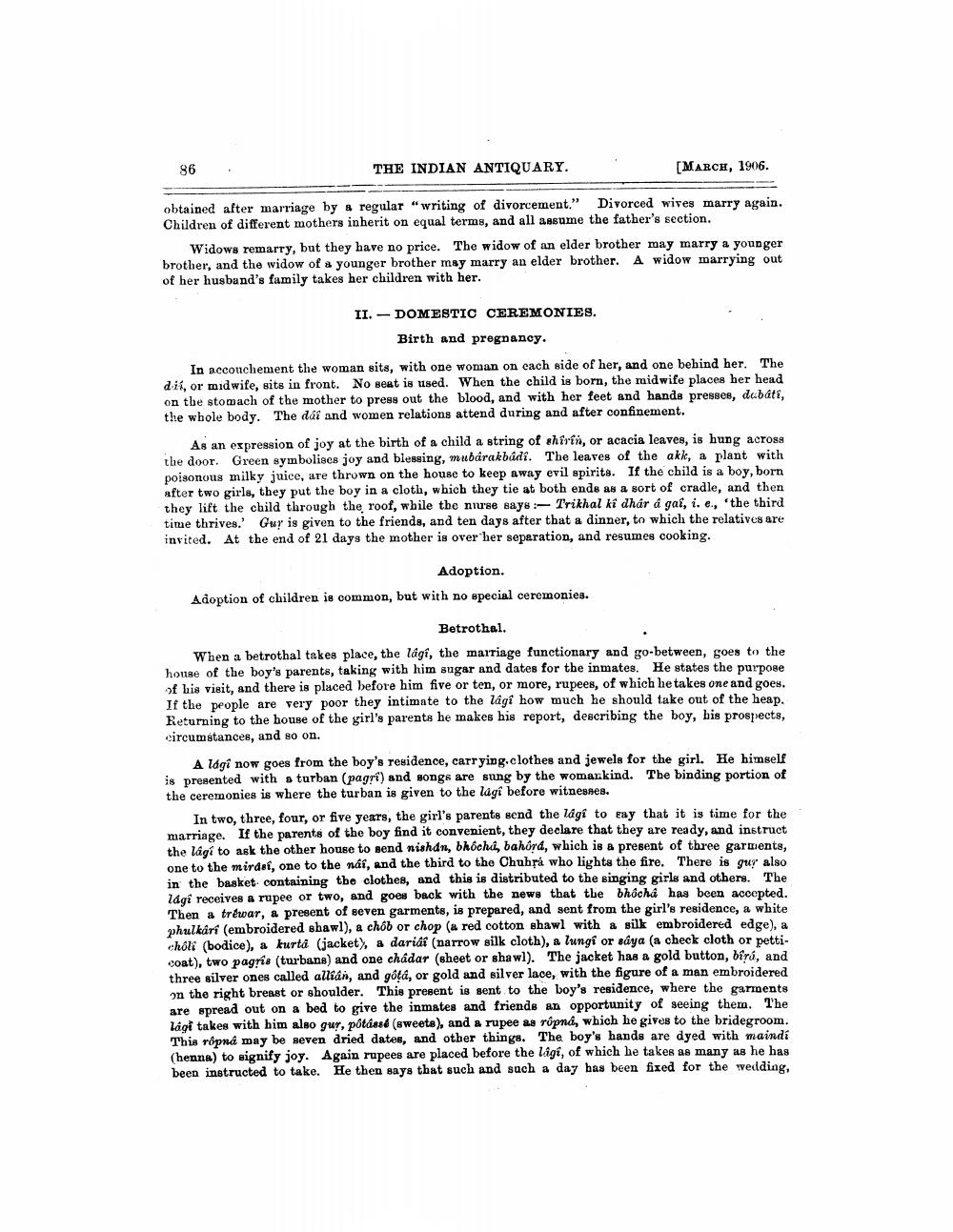________________
86
THE INDIAN ANTIQUARY.
[MARCH, 1906.
obtained after marriage by a regular "writing of divorcement." Divorced wives marry again. Children of different mothers inherit on equal terms, and all assume the father's section.
Widows remarry, but they have no price. The widow of an elder brother may marry a younger brother, and the widow of a younger brother may marry an elder brother. A widow marrying out of her husband's family takes her children with her.
II. - DOMESTIC CEREMONIES.
Birth and pregnancy.
In accouchement the woman sits, with one woman on each side of her, and one behind her. The dif, or midwife, sits in front. No seat is used. When the child is born, the midwife places her head on the stomach of the mother to press out the blood, and with her feet and hands presses, dobáti, the whole body. The dái and women relations attend during and after confinement.
As an expression of joy at the birth of a child a string of shirin, or acacia leaves, is hung across the door. Green symbolises joy and blessing, mubarakbådi. The leaves of the akk, a plant with poisonous milky juice, are thrown on the house to keep away evil spirits. If the child is a boy, born after two girls, they put the boy in a cloth, which they tie at both ends as a sort of cradle, and then they lift the child through the roof, while the nurse says - Trikhal ki dhár á gal, i. e., 'the third time thrives. Gur is given to the friends, and ten days after that a dinner, to which the relatives are invited. At the end of 21 days the mother is over her separation, and resumes cooking.
Adoption. Adoption of children is common, but with no special ceremonies.
Betrothal. When a betrothal takes place, the lâgî, the marriage functionary and go-between, goes to the house of the boy's parents, taking with him sugar and dates for the inmates. He states the purpose of his visit, and there is placed before him five or ten, or more, rupees, of which he takes one and goes. If the people are very poor they intimate to the lagi how much he should take out of the heap. Returning to the house of the girl's parents he makes his report, describing the boy, bis prospects, circumstances, and so on.
A lagi now goes from the boy's residence, carrying clothes and jewels for the girl. He himself is presented with a turban (pagri) and songs are sung by the womankind. The binding portion of the ceremonies is where the turban is given to the lagi before witnesses.
In two, three, four, or five years, the girl's parents send the lági to say that it is time for the marriage. If the parents of the boy find it convenient, they declare that they are ready, and instruct the läge to ask the other house to send nishdn, bhochii, bahord, which is a present of three garments, one to the mirdal, one to the nás, and the third to the Chubså who lights the fire. There is guy also in the basket containing the clothes, and this is distributed to the singing girls and others. The lagi receives a rupee or two, and goes back with the news that the bhôcha has been acoepted. Then a trêwar, & present of seven garments, is prepared, and sent from the girl's residence, a white phulkari (embroidered shawl), a chób or chop (a red cotton shawl with a silk embroidered edge), a chóli (bodice), a kurta (jacket), a dariái (narrow silk cloth), a lungs or saya (a check cloth or petticoat), two pagris (turbans) and one chádar (sheet or shawl). The jacket has a gold button, bírá, and three silver ones called allian, and gôtá, or gold and silver lace, with the figure of a man embroidered on the right breast or shoulder. This present is sent to the boy's residence, where the garments are spread out on a bed to give the inmates and friends an opportunity of seeing them. The lagi takes with him also gur, potássé (sweete), and a rupee as rúpna, which he gives to the bridegroom. This ropnd may be seven dried dates, and other things. The boy's hands are dyed with maindi (henna) to signify joy. Again rupees are placed before the låge, of which he takes as many as he has been instructed to take. He then says that such and such a day has been fixed for the wedding,




